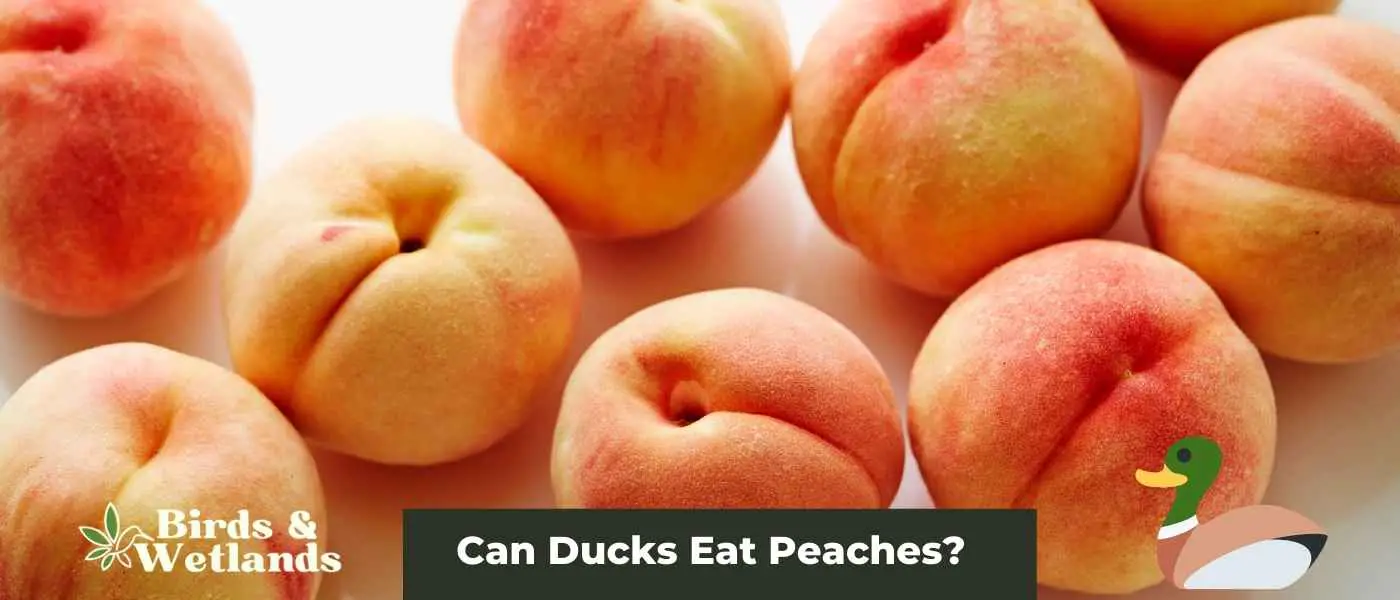Peaches are a sweet and juicy fruit loved by many, but before you offer them to your feathered friends, it’s important to consider whether they’re safe for ducks to eat.
We explore the pros and cons of feeding peaches to ducks, discuss the nutritional benefits and risks, and provide guidance on alternative treats that are both safe and beneficial for your beloved quackers.
Can ducks eat peaches?
Yes, ducks can eat peaches or mangos as an occasional treat. Peaches are a good source of vitamins and minerals, making them a nutritious snack for ducks. Ensure that the peach is ripe, remove the skin and pit, and cut it into small, manageable pieces to prevent choking.
Key Takeaways on Ducks Eating Peaches
You can feed peaches to your ducks. In fact, peaches can be a healthy addition to their grain diet or regular duck food.
Despite containing relatively low sugar and calories, you should be feeding ducks ripe peaches in moderation. How many peaches you feed your ducks depends on the other foods in their diet.
Peaches are delicious and nutritious. They can boost the duck’s intake of vitamins A and C. These summer fruits also contain phytonutrients such as carotenoids and flavonoids.
Can Ducklings Eat Peaches?
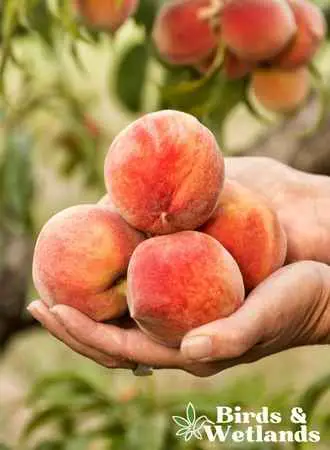
Yes, young ducks or ducklings can eat peaches. They can enjoy this nutritious summer fruit as a fun treat.
However, it is important for people raising ducks that a duckling’s nutritional and dietary needs differ from that of an adult duck.
During a duckling’s first four weeks, its diet should contain high protein through special duckling feed. Gradually adding peaches into their diet after the fourth week is a great way to incorporate this tasty fruit into their meals which can help prevent niacin deficiency. Ducks, particularly baby ducks, need a good amount of niacin in their diets.
When you feed peaches for the first time to your ducklings, make sure you cut the whole fruit into small pieces to make the fruits easier for the young ducks to eat and digest.
Can Ducks Eat Canned Peaches?
Ducks can eat canned peaches but in moderation. Even so, it is still a good idea to feed your flock fresh peaches instead of canned ones.
Canned peaches have a lot of processed sugar. As peaches soak in the syrup, they absorb extra sugar. Ducks that have too much sugar in their diet will gain weight.
Additionally, canned fruits may contain additional sodium. Too much sodium can be harmful to ducks and can even cause death.
Can Ducks Eat Dried Peaches?
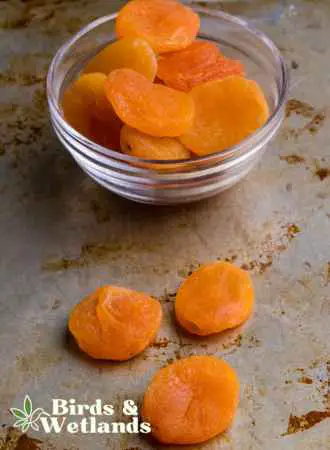
Even though ducks can eat dried peaches, it is not recommended as part of their diet. Dried peaches are high in sugar. Too much sugar can lead to obesity in ducks.
In addition, the moisture from the peaches is removed during the dehydration process. All that is left is the fruit’s flesh and sugar.
What Are the Health Benefits of Feeding Peaches to Ducks?
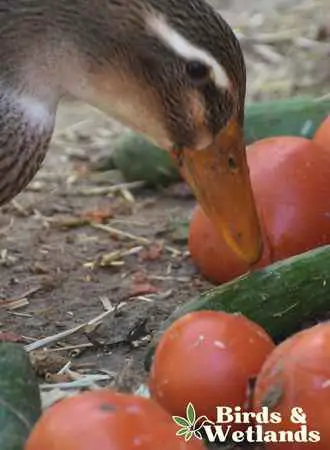
Are peaches good for ducks? Definitely. Peaches are packed with vitamins, minerals and essential nutrients that can help ducks stay healthy.
Vitamin A
Vitamin A is an essential nutrient for ducks. It supports ducks’ vision, reproduction, and immune system.
Ducks need vitamin A to maintain healthy vision. Vitamin A is also necessary for proper embryonic development and helps both ducks and ducklings fight off infection by stimulating the production of white blood cells. In drakes or male ducks, Vitamin A promotes healthy sperm production.
Vitamin C
Vitamin C is an essential nutrient for ducks and is necessary for various bodily functions.
Most importantly, this vitamin helps ducks maintain a healthy immune system. It accomplishes this by assisting in producing white blood cells, which aid in the body’s ability to fight infection.
Vitamin C is also required to form connective tissue, such as collagen. Healthy collagen formation is beneficial to ducks because it keeps their feathers healthy and intact.
Furthermore, vitamin C aids iron absorption, allowing ducks to maintain a healthy level of red blood cells.
Dietary Fiber
Dietary fiber is an important part of a duck’s diet. It aids in digestion and prevents constipation.
Dietary fiber also aids in the prevention of obesity and diabetes. It also helps lower cholesterol and improves heart health. Ducks that consume a high-fiber diet are less likely to become overweight or obese than those that do not consume enough fiber.
Prevents Niacin Deficiency
Niacin is an important nutrient for ducklings. It helps with growth, metabolism, and nervous system function.
Niacin’s role in bone development is one of its most important functions. Niacin promotes calcium absorption and keeps the blood’s phosphorus levels healthy.
Younger ducks with insufficient niacin have weaker bones and may be reluctant to walk or move around. Niacin deficiency can cause problems with metabolism and nerve function and death in severe cases.
What Are the Potential Health Risks of Feeding Peaches to Ducks?
Adding peaches to other treats for your or wild ducks can be beneficial to them. However, this summer fruit is not without risks.
Adult ducks tend to be attracted to the sweetness of ripe peaches, so it’s extremely important to avoid feeding these fruits in large quantities. Overfeeding them with peaches can lead to an unhealthy diet, resulting in obesity.
Even though peaches are low in acid, they can still cause acid reflux and upset stomach if consumed in large amounts.
Additionally, peaches can pose a serious risk to your ducks’ health if not prepared properly. They can be a choking hazard and peach pits contain highly toxic cyanide. A duck that ingests a peach pit could suffer from severe health issues or even death.
How to Serve Peaches to Ducks
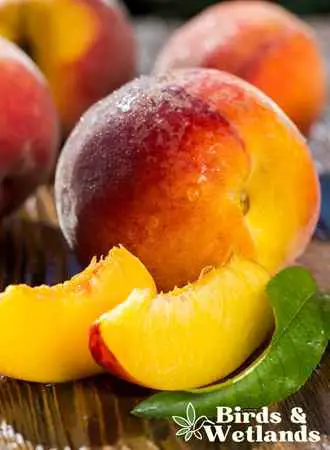
Ducks love peaches and these fruits are a good treat for them. Here’s how to serve peaches to your feathered friends.
Introduce peaches gradually. Even though most ducks eat peaches, some of them may not like the taste of the fruit.
Chop peaches into small cubes so that ducks can easily eat them and decrease the risk of ducks choking.
You can also feed ducklings and ducks with mashed peaches in water.
How many peaches can your duck eat depends on its diet. Peaches can be a good supplement to most foods such as small fish and whole grains.
Although peaches are safe for ducks, you should feed ducks peaches in moderation. Too many peaches can be bad for your ducks even if these fruits are nutritious.
Mix peaches with other fruits such as apples to make a delicious fruit mix. You can also mix peaches with commercial duck pellets to make a tasty treat.
Other Similar Foods for Ducks
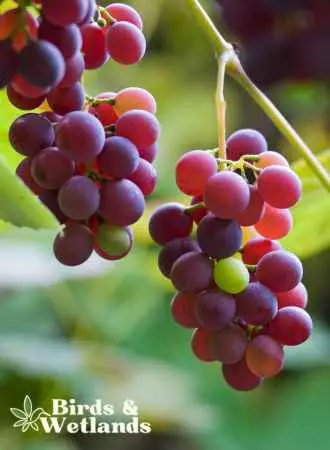
| Apples | Are Apples Good for Ducks? |
| Bananas | Can Ducks Enjoy Bananas? |
| Grapes | Can Ducks Eat Grapes Safely? |
| Watermelon | Is Watermelon Safe for Ducks? |
| Strawberries | Can Ducks Eat Strawberries? |
Best Duck Feed Pellets
Are you a duck owner looking for the perfect feed to keep your feathered friends happy and healthy? Look no further than Purina Duck Feed Pellets! With their nutritionally balanced formula and high-quality ingredients, these pellets are the ultimate solution for providing your ducks with the nutrition they need to thrive.
Pros
- Complete Nutrition: Purina Duck Feed Pellets are nutritionally balanced to provide all the essential vitamins and minerals that ducks need to stay healthy and strong.
- Easy to Digest: The pellets are specially formulated to be easy to digest, which makes them ideal for ducks of all ages.
- Promotes Growth and Development: With its balanced nutrition formula, Purina Duck Feed Pellets are designed to support healthy growth and development in ducks.
- Suitable for All Breeds: Whether you have domestic ducks or wild ducks, Purina Duck Feed Pellets are suitable for all breeds of ducks.
- Trusted Quality: Purina has been producing high-quality animal feed for over 100 years, so you can trust that your ducks are getting the best possible nutrition with Purina Duck Feed Pellets.
Cons
- Cost: Compared to other types of duck feed on the market, Purina Duck Feed Pellets can be slightly more expensive. However, many customers feel that the high-quality ingredients and balanced nutrition formula are worth the extra investment.
- Pellet Size: Some customers have noted that the pellet size of Purina Duck Feed Pellets can be quite large, which may not be suitable for smaller or younger ducks. However, many customers have reported that the pellets can easily be broken up or soaked in water to make them easier to eat.

